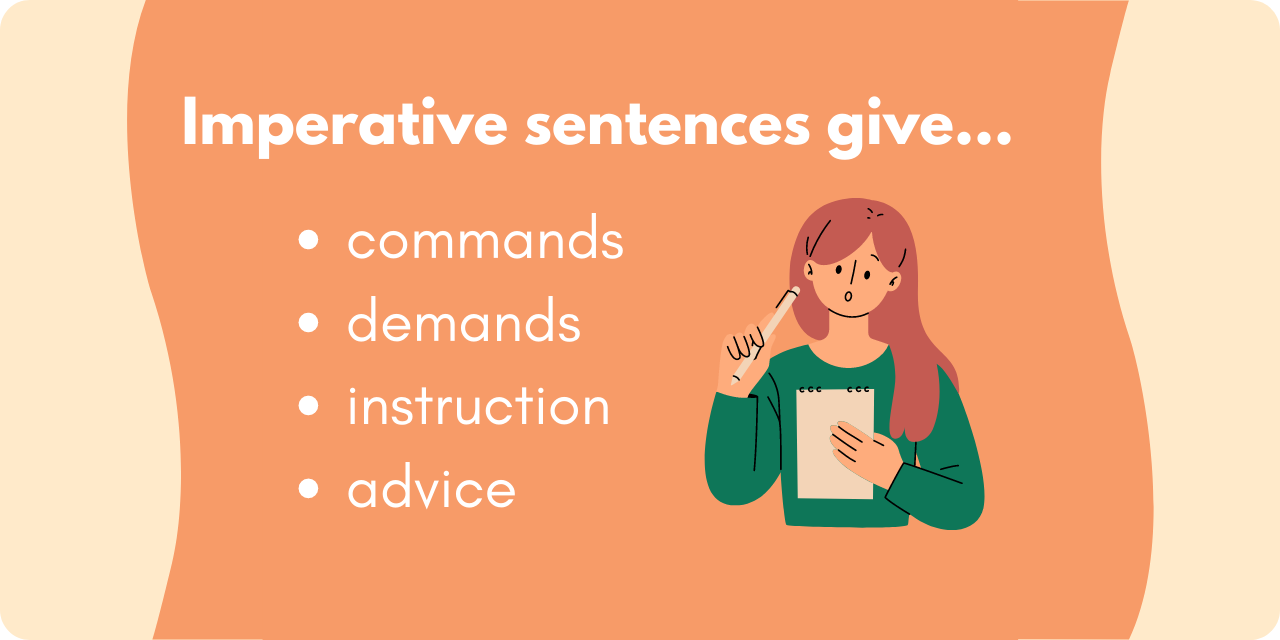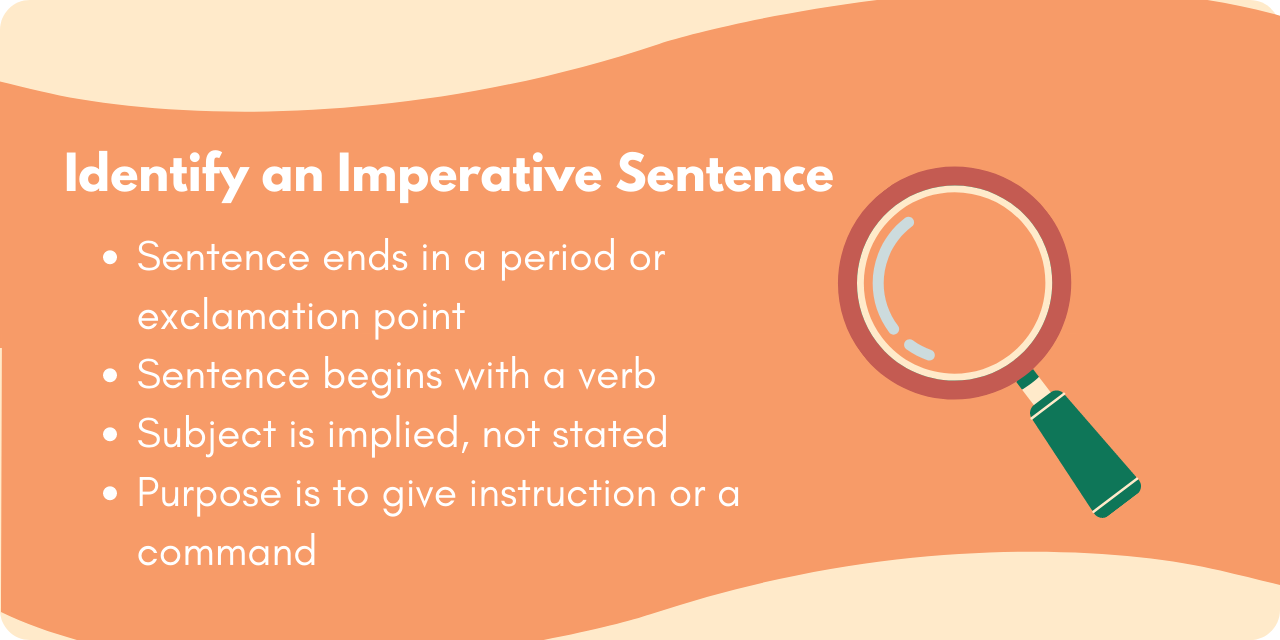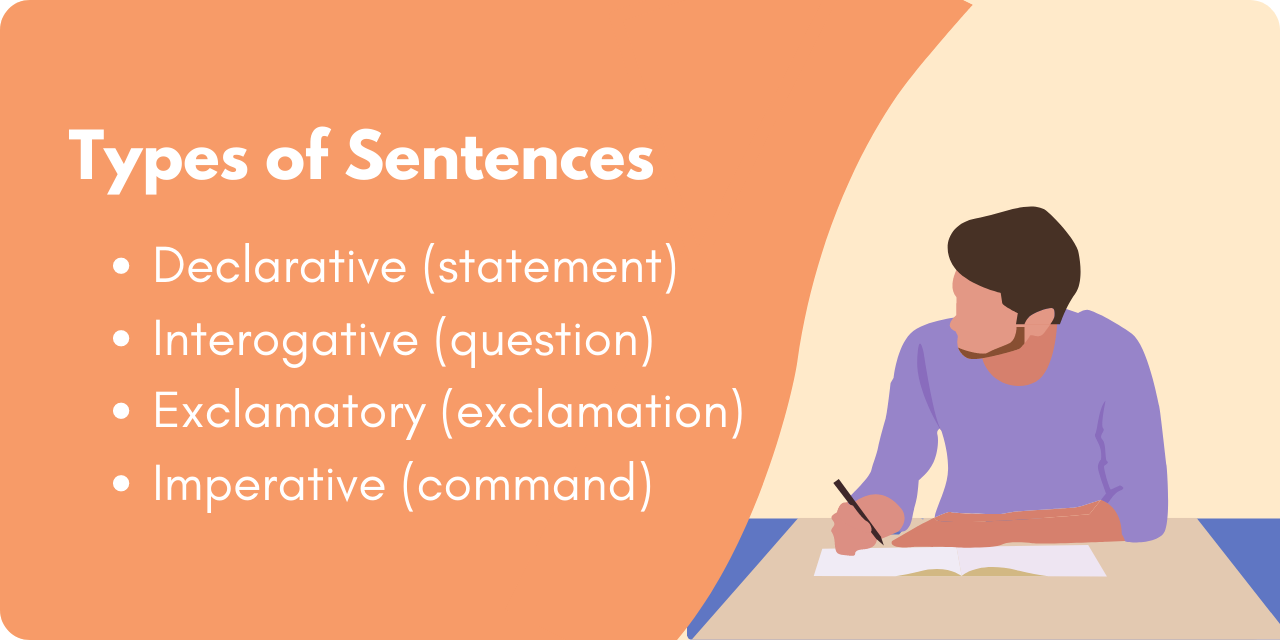An imperative sentence gives a demand, command, or instruction directly to an audience and typically begins with an action word (a verb). These sentences often appear to be missing a subject or the person, place, or thing that performs a main action. This is because the subject in this type of sentence tends to be the audience being addressed directly or commanded to do something.

Implied Subjects
The subject of imperative sentences is usually you (a placeholder for the audience or whoever the speaker is speaking to). Because this pattern is widely understood, the subject is often left out of the sentence and is only implied (understood by the audience to be there without it needing to be said). Take, for example, “Eat your lunch.” This imperative sentence begins with the verb eat, whose function is as a command. The subject of the sentence is you being told to eat, even though this subject doesn’t directly make an appearance. Due to the context, the subject can be left out of this imperative sentence, and the audience will still understand it.
The subject of imperative sentences is not always omitted, however. Look at this example from the book Harry Potter and the Deathly Hallows by J.K. Rowling. “‘Potter…..Tell them I mean no harm’” said by Professor Umbridge. In this example, Umbridge is ordering Harry to save her from the centaurs in the scene “Skirmish in the Forbidden Forest”. Tell is the verb and the direct command, and Potter is the subject.
Affirmative versus Negative
Imperative sentences can either be affirmative or negative, which means that they can tell a person to do or not do something. The two examples provided above are affirmative imperative sentences: they are telling someone to do something (tell in this last example).
Here’s an example of a negative imperative sentence:
“Don’t touch the hot stove.”
Here, instead of telling someone to do something, you’re saying not to do something.
Helper Words
Imperative sentences won’t always start with verbs. As these sentences can sometimes come across as pushy or impolite, you can use words like please to soften the message. For instance, you could say “Please eat your lunch.” Even though it doesn’t start with a verb, this sentence is still imperative, as long as it’s directly issuing a demand or command.
Additionally, you can also describe how you want a specific action to be done by using adverbs, words that describe verbs. For instance, you could say: “Kindly state your opinion” or “Quickly run to the store for me.” In these cases, kindly and quickly both describe the way you’d like an action to be done.
Examples:
As previously stated, imperative sentences are used to issue a command or instruction, make a request or demand, or offer advice. Basically, they tell people to do something. Below, you’ll find some examples to learn about their function.
Imperative sentences will usually end with a period but once in a while end with an exclamation point. These sentences are often referred to as directives because they provide “direction” to whoever is being spoken to.
In these examples of imperative sentences here, you’ll note that each one is issuing a command of some sort:
- Pass the potatoes.
- Move out of the way!
- Shut the bathroom door.
- Find my wool sweater.
- Be there at seven.
- Clean your room.
- Complete these by noon.
- Consider the red hat.
- Wait for us.
- Get out!
- Make sure you pack summer clothes.
- Choose Eddie, not Steven.
- Please be quiet.
- Be nice to your friends.
- Play this game with me!
Identifying An Imperative Sentence
The first clue about an imperative sentence is its punctuation. Most of these kinds of sentences end with a period and sometimes an exclamation. Just be careful because imperative sentences aren’t the only sentences that end with a period or exclamation mark (as you’ll see below). The punctuation is your first clue that you may be looking at an imperative sentence.
Then, take a look at the verb in these sentences. Generally, imperative sentences begin with verbs that issue a demand or command. Another indication is the subject. Do you see a subject? Typically, the subject of an imperative sentence will be implied, not stated, as it is giving a direct order.

The main purpose of an imperative sentence is to provide instruction, make a request, command, or demand, or offer an invitation or advice. Take another look at a few imperative sentences and consider their functions:
- Preheat the oven. (Instruction)
- Use cooking spray in the pan. (Instruction)
- Don’t eat all the brownies. (Request or demand)
- Stop feeding the dog from your plate. (Request or demand)
- Come out with us this weekend. (Invitation)
- Please join us for drinks. (Invitation)
- Choose the Doberman Pinscher, not the German shepherd. (Advice)
- Wear your rose gold necklace with that outfit. (Advice)
Other Kinds of Sentences
Imperative sentences are one out of four main types of sentences. The other three are:
- Declarative sentences
- Exclamatory sentences
- Interrogative sentences
We’ll take a brief look at each type of sentence and how you can distinguish them all from an imperative sentence.
Declarative
Imperative and declarative sentences are oftentimes mixed up because both of them can end with a period.
Here is the main difference. Declarative sentences do not issue commands, provide instructions, or offer invitations; they only make a statement or offer an opinion. Basically, they make a declaration.
- I am traveling to Ireland. (Statement)
- Ireland is gorgeous. (Opinion)
Exclamatory
An exclamatory sentence will express heightened emotions like excitement, surprise, rage, or joy. They always end with an exclamation mark.
Because an imperative sentence can also end with an exclamation mark, you’ll have to ask yourself if the sentence is expressing a feeling (exclamatory) or issuing a command (imperative). For example:
- Get out of here! (Imperative sentence)
- I wish he would leave! (Exclamatory sentence)
Interrogative
An interrogative sentence asks a question. These sentences will end with a question mark and often start with such words as who, what, where, when, why, how, or do.
- When will your book be finished?
- Do you still have my shirt?

Imperative Power
When issuing a demand or instruction, know that you are in an imperative state of mind. Anything else would be categorized as declarative, interrogative, or exclamatory. As you progress on in your reading and writing, have fun classifying each new sentence you come upon!
Related: We have an excellent article regarding crafting the perfect opening sentence for an email, where you can try your new-found knowledge of the found types of sentence.






